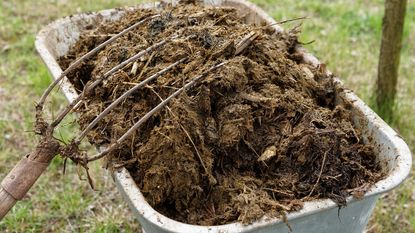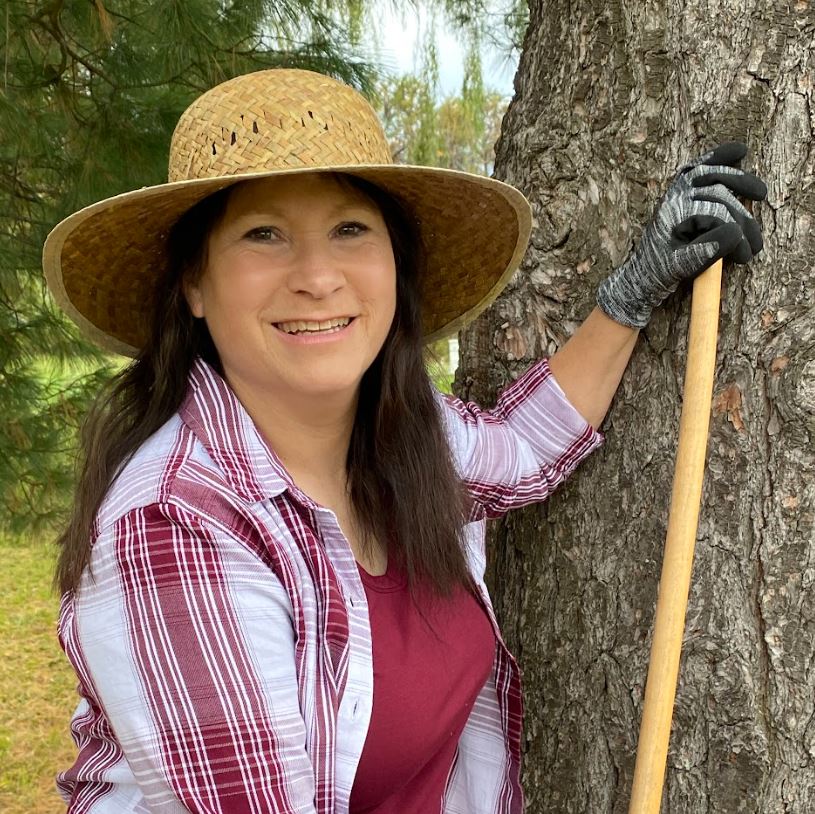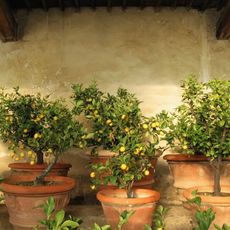My Gardening Secret - Composted Horse Manure


I had a gardening secret and didn't know it. I only discovered this secret when my neighbor told me she was jealous of my garden soil. Now there's a lot to be jealous about when it comes to growing a garden, but the soil? Besides, we live next door to each other. Wouldn't we have the same soil in our gardens?
Amending Soil with Horse Manure Compost
It's true that my neighbor and I started out with the same horrible clay-based soil. It's also true that we have both amended our garden soil over time. The difference is that I used horse manure compost to improve the quality of the soil in my veggie garden and flowerbeds.
For me, composting horse manure was a necessity that stemmed from my desire to own these gorgeous manure-producing machines and my inability to afford anything larger than a two-acre property. With each horse producing over 10 tons of stall waste per year and nowhere to spread it, I knew I had to set up a system for composting horse manure quickly and easily.
Benefits of Composted Horse Manure
At the time, I didn't realize the benefits of using horse manure as fertilizer. It was simply a means for getting rid of an unwanted waste material. Now that I've discovered exactly how beneficial composted horse manure is for my garden, I'd like to share my secrets for using this natural fertilizer:
- Avoid using use fresh horse manure as fertilizer directly around garden plants. Not only does this increase the likelihood of food-borne pathogens infecting our food, but even small amounts of horse manure can generate sufficient heat to damage plants.
- Horse manure can be spread directly on the garden in fall, then tilled in or covered with chopped leaves or grass clippings. It will naturally break down over the winter and be ready for the garden plants to use the following spring.
- When using horse manure as fertilizer, only spread 2-3 inches (5-7.6 cm.) of stall waste on the garden at a time. Initially, the decomposition process can rob the soil of nitrogen. As the manure breaks down, nitrogen will then become available to the plants.
- Limit the amount of wood-based bedding when composting horse manure. To maintain an optimal carbon-to-nitrogen ratio, I clean the stalls daily and only remove soiled bedding. Too many wood shavings slows down the composting process unless an additional source of nitrogen is added.
- Horse manure tends to be full of weed seeds. Granted, it's more work to pile stall waste in a compost bin, then shovel it out again. But properly composted, horse manure heats up and kills weed seeds.
- When using horse manure as fertilizer, the NPK will be approximately .7-.3.-.7. This makes composted horse manure a good general fertilizer for most fruiting and flowering plants.
- It's free! And not just for me because I own horses. Check with your neighboring horse owners or local horse boarding stables to acquire your own continuous supply of free horse manure.
Gardening tips, videos, info and more delivered right to your inbox!
Sign up for the Gardening Know How newsletter today and receive a free download of our most popular eBook "How to Grow Delicious Tomatoes."

Laura Miller has been gardening all her life. Holding a degree in Biology, Nutrition, and Agriculture, Laura's area of expertise is vegetables, herbs, and all things edible. She lives in Ohio.
-
 How To Grow Garden To Table: A Guide For Home Cooks
How To Grow Garden To Table: A Guide For Home CooksWhat could be better than a meal that comes directly from garden to table? Show off your gardening and culinary skills with the very freshest food.
By Bonnie L. Grant
-
 Want a Backyard Mini Orchard? Create Your Own Container Orchard
Want a Backyard Mini Orchard? Create Your Own Container OrchardEasier to care for in small spaces, a backyard mini-orchard makes sense for busy gardeners and juicy fruit is the reward.
By Teo Spengler